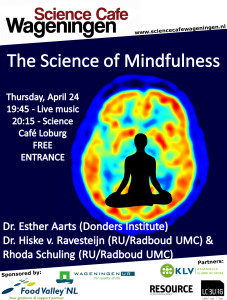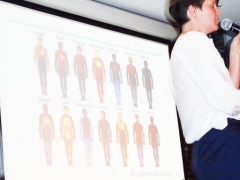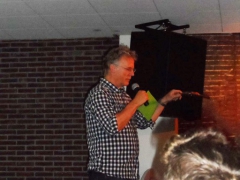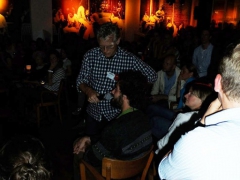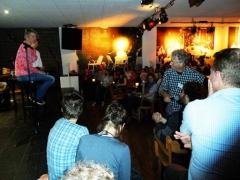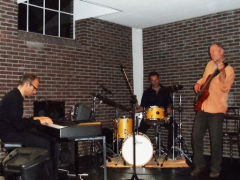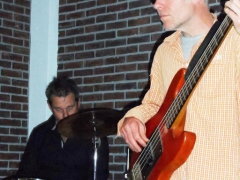Summary
“Few of us ever live in the present. We are forever anticipating what is to come or remembering what has gone.” (Louis L’Amour)
Is there a science behind mindfulness? Can the effects of this ancient Buddhist philosophy be assessed scientifically? Psychologists discover more and more the impact of mindfulness therapy on patients with mental problems. The theory behind – and the effects of – the so called Mindfulness Based Cognitive Therapy were discussed last Thursday during the Science Cafe Wageningen session about mindfulness. The guest speakers were Drs. Rhoda Schuling and Dr. Hiske van Ravesteijn from the Medical Centre for Mindfulness of the Radboud University Nijmegen. Both guests conduct research on the effectiveness of mindfulness therapy on patients suffering from medically unexplained symptoms (Schulding) and recurrent depression (van Ravesteijn). Mindfulness therapy consists of an eight weeks training in which patients are guided by specialized psychologists to be trained to regain their inner mindfulness mind-set. By devoting to inner compassion, living in the present without worrying about the past or future, acceptance, meditation and sympathy for emotions and physical sensations patients become aware of their behaviour- and thought patterns and try to change them for the better. With this approach the focus of recovery of patients shifts from solutions that provide short term pain relief towards a focus on acceptance of discomfort as a part of life.
This session of Science Cafe Wageningen was a remarkable session, in which the audience underwent a (very) short mindfulness training under the guidance of our guest speakers. After that, the audience could listen to the speech of the guests with an open, non-judgmental, investigative awareness (the mindfulness mind-set). Nevertheless, critical questions were asked during the discussion round. Such as the question how the researchers could conduct their research with objectivity while at the same time being obvious enthusiastic about the mindfulness therapy. The answer: objectivity is retained by having the therapy conducted and questionnaires filled out under supervision of other psychologists and not by the researchers who design the studies and analyse the data. Another interesting discussion centered around the question whether or not the effects could be due to a placebo, or in other words how sound are the control groups as a control? In answer to that the researchers told that randomized, controlled trials showed that the mindfulness therapy show strong effects when excercised in addition to the regular (other) treatment of the patients.
Our moderator was Jelle de Gruyter.
The Jazz Trio ‘De Mannetjes’ started out in the late 1980s, consisting of three musicians who had individually built up a track record in a wide variety of musical groups and bands, ranging from afro-latin and jazz to blues, pop and classical music. In the trio, ‘De Mannetjes’ bring together their individual skills to construct a joint sound which builds on the tradition of the piano jazz trio (with such fine examples as Bill Evans, Oscar Peterson) with a large input of latin feel and Cuban input to bring music with a smile.
Over the years ‘De Mannetjes’ have worked with a large array of musicians, and today ‘De Mannetjes’ are still the motor behind quartets such as Chicharon and Marinbondo. ‘De Mannetjes’ consists of Eric de Zeeuw (Piano), Koen Boschman (bass) and Luc van Hoof (drums). More info on: https://www.facebook.com/demannetjesjazz.
Presentations
2014 Presentation Science Cafe WUR 24 April 2014 RS
Gallery

